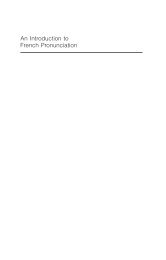English Language Teaching in its Social Context
English Language Teaching in its Social Context
English Language Teaching in its Social Context
Create successful ePaper yourself
Turn your PDF publications into a flip-book with our unique Google optimized e-Paper software.
theby60 ROD ELLISdeem necessary. Crookes (1 993), however, argues that when research is entirely local andno attempt to generalize is made it is less necessary to conform to the requirements ofreliability, validity, and trustworth<strong>in</strong>ess. He also suggests that action research reports do notneed to be academic <strong>in</strong> style.They can take the form of ‘teacher-oriented reports’ and thusbe more discursive, subjective, and anecdotal. The difference between the positions ofBrumfit and Mitchell and Crookes are <strong>in</strong>dicative of the lack of clear criteria for determ<strong>in</strong><strong>in</strong>gwhat constitutes good quality action research.From the educational perspective described above, the gap between the researcher/theorist on the one hand and the practitioner on the other is seen as the <strong>in</strong>evitable productof the social (and, one might add, political) worlds which they <strong>in</strong>habit. As Kramsch (1995)has po<strong>in</strong>ted out the behaviours that these two social groups typically manifest are symbolicof the value systems to which they adhere. The move to <strong>in</strong>volve teachers <strong>in</strong> research canbe seen, <strong>in</strong> part, as a move to reshape the symbolic capital of teachers’ behaviour by <strong>in</strong>vestigat<strong>in</strong>git with the authority to be derived from research.This is one reason why the rationalefor action research so frequently makes reference to <strong>its</strong> contribution to professionalism <strong>in</strong>the teach<strong>in</strong>g fraternity.One way of view<strong>in</strong>g action research is as a means by which teachers can test ‘provisionalspecifications’ (Stenhouse 1975) <strong>in</strong> the context of their own classrooms.These specificationscan be drawn from the teacher’s own practical knowledge, <strong>in</strong> which case action research canhelp to make explicit the pr<strong>in</strong>ciples, assumptions, and procedures for action that comprisethis k<strong>in</strong>d of knowledge. Alternatively, the specifications can be drawn from the technicalknowledge provided by research. Action research serves as an empirical test of whether thegeneralizations provided by confirmatory research or the understand<strong>in</strong>gs provided by <strong>in</strong>terpretativeresearch are applicable to specific classroom sett<strong>in</strong>gs. When teachers consistentlyf<strong>in</strong>d the results of their own research do not support the f<strong>in</strong>d<strong>in</strong>gs of confirmatory or<strong>in</strong>terpretative rcscarch they need to be prepared to reject these as <strong>in</strong>applicable to theirown contexts. Action research, then, functions as a way of implement<strong>in</strong>g the third of Weiss’models of research use ~ <strong>in</strong>teractive model ~ bridg<strong>in</strong>g the gap between technicalknowledge and practical knowledge.The question arises as to whether the applicability of proposals based on research mustnecessarily be submitted to an empirical test by requir<strong>in</strong>g teachers to take on the role ofresearcher (as Stenhouse advocates) or whether it might be possible to predict which proposalsare likely to be acted on through an exam<strong>in</strong>ation of the proposals themselves. It seemsreasonable to suppose that some proposals are <strong>in</strong>herently more practical than others. Whatmakes them so?To address this question we turn to the study of the uptake of <strong>in</strong>novations.Innovationist perspectiveA number of applied l<strong>in</strong>guists have recently turned to work on <strong>in</strong>novation to help themunderstand the variable success they have observed <strong>in</strong> both large-scale language projects <strong>in</strong>the develop<strong>in</strong>g world and the variable response to new ideas among teachers <strong>in</strong> the developedworld. Kennedy (1 988), White (1 988 and 1993) and Markec (1 993) have all drawn on<strong>in</strong>novation research <strong>in</strong> a variety of discipl<strong>in</strong>es (e.g. Rogers (1 983) <strong>in</strong> sociology, Lambrightand Flynn (1 980) <strong>in</strong> urban plann<strong>in</strong>g, Cooper (1 989) <strong>in</strong> language plann<strong>in</strong>g and Fullan (1982)and (1 993) <strong>in</strong> education). Henrichsen (1 989), Bcretta (1 990), Stoller (1 994) and Markee(1 994b) have reported actual studies of <strong>in</strong>novation <strong>in</strong> language teach<strong>in</strong>g. It should be noted,however, that to date there has been no study of <strong>in</strong>novations stemm<strong>in</strong>g from proposals basedon SLA.‘~












